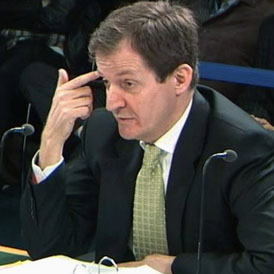Campbell’s Iraq evidence contradicted
A senior intelligence officer directly contradicts Alastair Campbell’s claims that the Iraq dossier wasn’t “beefed up” to make the case for war.
Campbell, Tony Blair’s former communications director, last year dismissed suggestions he sought to “beef up” the September 2002 dossier on Saddam Hussein’s supposed weapons of mass destruction.
“It was not the case for war, it was the case why the Prime Minister had become more concerned,” he told the Chilcot Inquiry into the Iraq War.
But Major General Michael Laurie, the Ministry of Defence’s Director General for intelligence collection from 2002 to 2003, said this was the opposite of the instructions given to the officials who drafted the dossier.
He said in a statement released by the Chilcot Inquiry today: “Alastair Campbell said to the inquiry that the purpose of the dossier was not ‘to make a case for war’.

“I had no doubt at that time this was exactly its purpose and these very words were used.”
Another document that had been produced six months earlier had been thrown out as it had “not made a strong enough case”, he said.
The purpose of the dossier was precisely to make a case for war, rather than setting out the available intelligence Major Gen Laurie
“The previous paper, drafted in February and March, known to us then also as the dossier, was rejected because it did not make a strong enough case.
“From then until September we were under pressure to find intelligence that could reinforce the case.”
Read more: Campbell on the ‘dodgy’ dossier
But despite what he said was probably the most thorough “scrutiny of every piece of ground in any country” he “could find no evidence of planes, missiles or equipment that related to WMD, generally concluding that they must have been dismantled, buried or taken abroad,” he said
Maj Gen Laurie said it was “clear” to him that direction and pressure were being applied to the Joint Intelligence Committee (JIC), whose chairman, Sir John Scarlett, was the author of the dossier.
He went on: “We knew at the time that the purpose of the dossier was precisely to make a case for war, rather than setting out the available intelligence, and that to make the best out of sparse and inconclusive intelligence the wording was developed with care.”
“The question that needs to be asked is, if there had been no remit to draft the ‘dossier’, would the JIC in their normal process have produced papers that would have come to the same assessment as the dossier?”
The Iraq report is due later this year and the inquiry panel, headed by Sir John Chilcot, is currently considering all the material it has received – including de-classified documents and evidence given during more than 100 public hearings over the past 18 months.